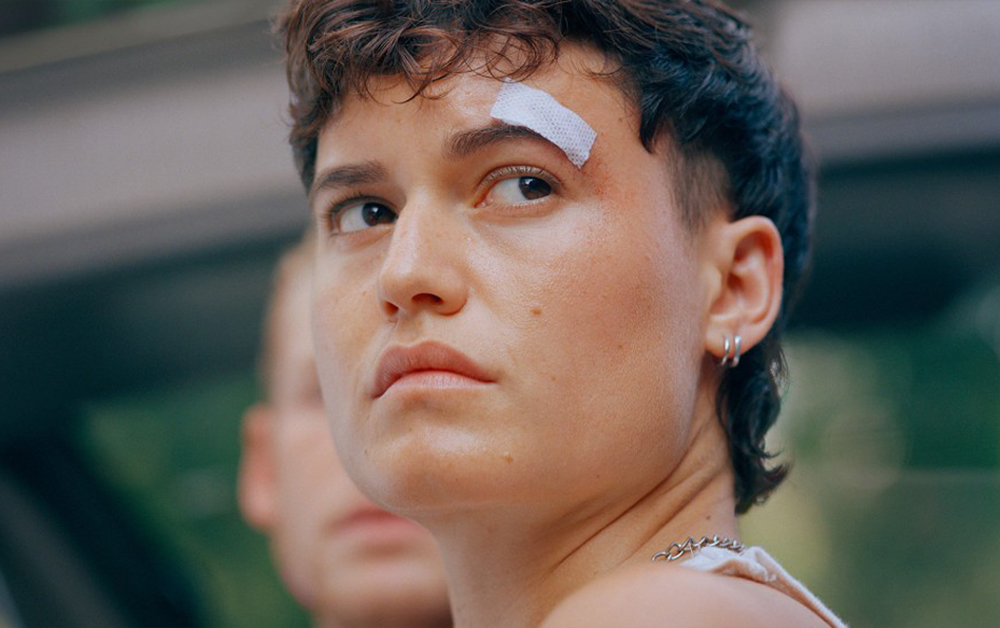“He’s fine. Awkward, honestly,” Feña (Lío Mehiel) tells his roommate Fiona (Jari Jones) about his father Pablo (Alejandro Goic) in “Mutt” upon returning to the night club where the two had looked to blow off some steam with their friend Aidan (Jasai Chase Owens), but the evening has taken another turn after excusing himself to take Pablo’s call a day before his plane is set to touch down in New York from his native Chile. Feña is naturally stressed out about picking him up from the airport, but if he’s being honest that’s the least of his concerns upon seeing him for the first time in two years, when Pablo still hasn’t yet shaken off the habit of calling his child Fernanda and the call that takes him outside puts him in the line of sight of his ex-boyfriend John (Cole Doman), who has returned to the Big Apple after the two broke up amidst his transition and left for Philadelphia.
The torturous moment for Feña proves to be a fascinating one for writer/director Vuk Longlulov-Klotz to settle into when “Mutt” sees its lead having to relitigate issues that he surely thought were settled after finding a comfort in his own skin and a sustainable life in the city with a small circle of support. Over the course of a tense 24 hours, that sense of stability is challenged in ways that aren’t ever a big enough threat to upend it completely, but reveals how fragile it all is when even small reminders of a past life, like cashing a check with a dead name on it, create mental blocks if not more obviously insurmountable impediments. Feña is not one to avoid conflict, thinking nothing of going through his contacts to borrow a car to pick up his father and being the one to initiate contact with John upon seeing him from across the bar. But as Longlulov-Klotz keenly observes, what confidence Feña has shouldn’t be confused with being able to predict how everyone in his life was going to react to a situation that none of them signed up for, all on their own timetables as far as adjusting to the transition and grappling less with seeing Feña in a different gender than having concerns about how he might be the same person he always was when it comes to considering others’ feelings.
In spite of the messiness of the subject subject, “Mutt” unfolds elegantly, attuned to small details that illuminate the resourcefulness that Feña has drawn on internally and externally to build a life for himself independent of anyone else, savvily handling any curveball that’s thrown his way on the hectic day including the surprise arrival of his younger sister Zoe (MiMi Ryder), who wants to flee their mother’s control as he once did. However, as well as Feña deals with practicalities, negotiating emotions that come with the constant resistance to just letting him be is considerably more thorny and a burden that Mehiel wears with just the right amount of weight, never allowing it to overwhelm but making each step just a little heavier than it is for others.
The film carries a similar heft even as it’s fleet of foot, with cinematographer Matthew Pothier’s compositions where Feña can be at the center of a frame and nonetheless feel distant from himself with intriguing choices of lighting and angles that rarely call attention to themselves for as striking as they are and Longlulov-Klotz wisely having solutions crop up as organically and readily as problems do, obfuscating its persistent narrative drive to come across as a true slice of life. Ultimately, when Feña has to endure at least twice as much to achieve a level of acceptance that comes naturally to others, the sophistication required by the production to get at such a powerful simplicity seems like the most appropriate way to do the character justice.
“Mutt” opens at the Cinema 21 in Portland, Oregon on September 16th.




